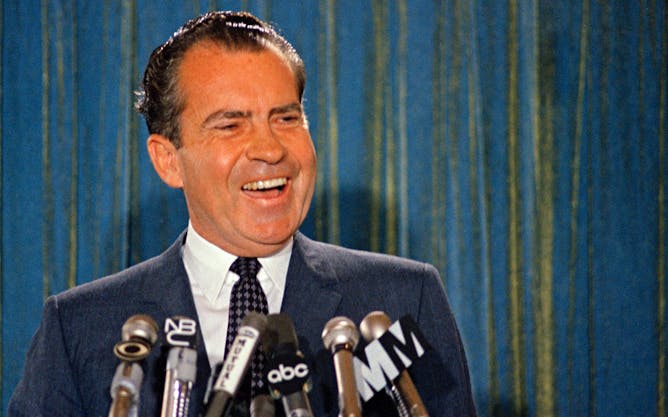Editor's note
|
|
Last summer, with Hurricane Irma headed toward the Turks and Caicos Islands, biologist Colin Donihue and his colleagues wrapped up their fieldwork studying Anolis scriptus lizards and headed for home. In the wake of Irma and subsequent Hurricane Maria, Donihue realized the catastrophic storms had provided his team with a natural experiment. They returned to the islands to see whether hurricane survival was random for these lizards or if “some were better suited to hanging on for their lives.”
A new national poll reveals that millennials – born between 1981 and 1996 – answered the question “Should the U.S. ‘take an active part’ or ‘stay out’ of world affairs?” quite differently than older Americans. Public policy professor Bruce Jentleson looks at the poll results, and considers what millennials’ point of view may have to teach the rest of America.
Fifty years ago, when an insurance agent named Paul Simpson was shocked to learn that ABC, NBC and CBS destroyed their nightly news footage after a couple of weeks. Simpson was already suspicious that TV news – with its anti-conservative streak – was a malign influence over the electorate. Now he had discovered that there would be no way to hold them accountable. Vanderbilt historian Thomas Alan Schwartz tells the story of how
Simpson created an archive of television news footage – and even managed to get Richard Nixon’s White House on board.
|
Maggie Villiger
Science + Technology Editor
|

|
|
Top stories
|

Holding on in hurricane-force winds.
Colin Donihue
Colin Donihue, Harvard University
In the wake of two hurricanes in the Turks and Caicos Islands, researchers document for the first time that catastrophic storms can be agents of natural selection, influencing how species evolve.
|

Millennials are not into the ‘We are the greatest country’ idea.
Shutterstock
Bruce Jentleson, Duke University
Millennials are less inclined than older Americans to intervene abroad, maintain superior military power or believe the US is an exceptional nation. What does that mean for the country's future?
|

Republican presidential candidate Richard Nixon smiles fur the cameras during a 1968 news conference.
AP Photo
Thomas Alan Schwartz, Vanderbilt University
Fifty years ago, an insurance agent named Paul Simpson was convinced of rampant bias on the evening news. So he embarked on a project to record each broadcast and store them at Vanderbilt University.
|
Science + Technology
|
-
Jonti Horner, University of Southern Queensland
Researchers have found evidence of a large lake of salty water, buried 1.5 kilometres beneath the southern polar ice cap on Mars. So what does that mean for life on the red planet?
-
Behzad Mirhashem, University of New Hampshire
A recent US Supreme Court ruling marks a new milestone in the debate over police power and privacy in the digital age.
|
|
Politics + Society
|
-
Vincent Joos, Florida State University
After weeks of protest in Haiti, sparked by a sudden rise in fuel prices, at least seven are dead and the prime minister is out. Foreign creditors pushed for the price hike as an austerity measure.
-
Katharine Adeney, University of Nottingham
There are no angels in Pakistan's political scene – except the 'angels' of the military.
|
|
|
|
|
|
|
|
|
|
Trending on site
|
-
Robert L. Fischer, Case Western Reserve University
A White House Council concluded that the war on poverty is "largely over." But, while poverty among seniors has declined, poverty among adults and children as changed little over the last 40 years.
-
Jeffrey Miller, Colorado State University
Is a shot of tequila actually good for you? And what's the deal with the worm? To celebrate National Tequila Day, a food historian explores some little-known aspects of the popular Mexican spirit.
-
Jennifer Mercieca, Texas A&M University
Aristotle coined the term "enthymeme" to refer to arguments, words and ideas that are broadly accepted among the people of a nation. So what happens when enthymemes start to disappear?
|
|
Today’s chart
|
-

 |
Jesse Grady
Mississippi State University
|
| |
| |
| |
|
|